Natural Herbal Dewormers for Happy, Healthy Goats
Looking for natural dewormers for your goats? Check out our guide for effective and safe options to keep your goats happy and healthy.
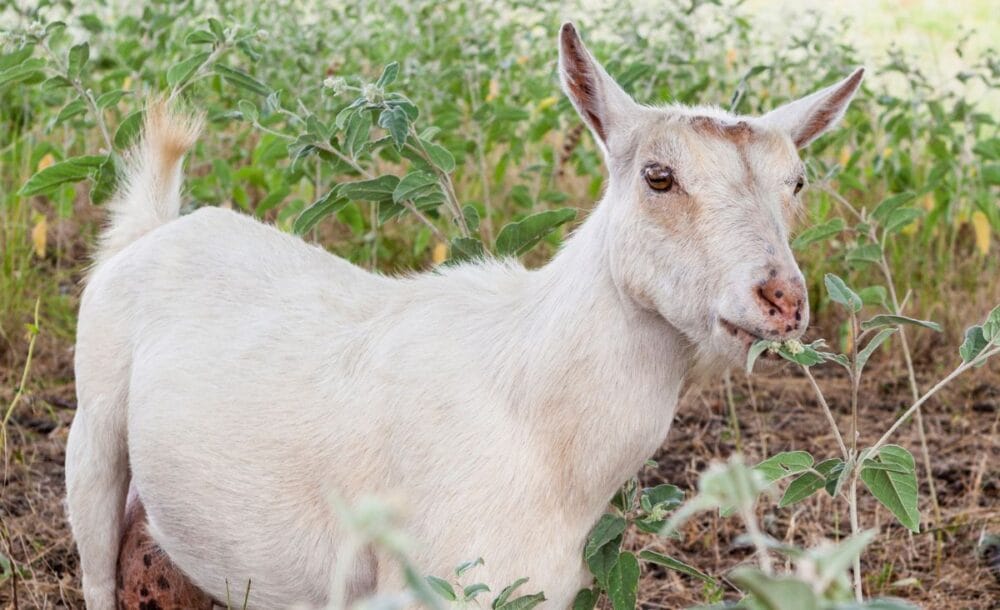
A holistic approach to caring for goats means knowing how important it is to deworm them. Traditional methods do exist, but looking into natural alternatives goes along with eco-friendly and sustainable practices. Let me share the alternatives I use with my Nigerian Dwarf Goat herd. We utilize many of these natural ingredients in our herbal goat treats.
We will talk about effective natural dewormers, which will help your goats stay healthy without hurting them or the environment.
The Vital Role of Deworming
When you deworm your goats, you protect their health and prevent the potentially devastating effects of internal parasites. GI worms, coccidia, and liver flukes are some of the most common parasites that can hurt a goat’s health. They can cause anemia, weight loss, diarrhea, and slower growth rates, among other problems.
Understanding the Menace
Gastrointestinal Worms: Worms that live in the digestive tract include the barber pole worm (Haemonchus contortus) and the tapeworm (Trichostrongylus colubriformis). A heavy worm load can cause anemia and weight loss.
Coccidia: Coccidia are protozoan parasites that infect the intestines and cause watery diarrhea, dehydration, and stunted development.
Liver Flukes: Parasites, such as Fasciola hepatica, that live in the liver can hinder its ability to process nutrients, which can have a negative impact on health as a whole.
The Pitfalls of Chemical Dewormers
Although chemical dewormers are commonly used, they have some problems. Parasites can become immune to these chemicals over time, which makes them less effective. Repeated use may also leave chemical residues in milk or meat, which could be bad for the health of both goats and people who consume the milk from them.
Herbal Goat Dewormers
Natural ways to get rid of worms are more holistic and do not come with the risks that come with chemicals. Wormwood, garlic, and pumpkin seeds are some of the herbs that can help get rid of and control parasites. These natural remedies will not only help with the immediate problem, but they will also help your goat herd stay healthy and strong in the long term.
Tip: Conduct regular fecal egg counts to assess the effectiveness of your chosen natural deworming methods.
Wondrous Wormwood
Wormwood (Artemisia absinthium) is a powerful natural dewormer that protects against all kinds of internal parasites in goats.
Effectiveness: Wormwood, which is full of compounds like absinthin, stops parasites from reproducing and growing in the digestive system.
How to Use: Wormwood should be used in moderation, since too much of it can be harmful. People usually give it to their goats as a dried herb, mixed into their food, or as a tea.
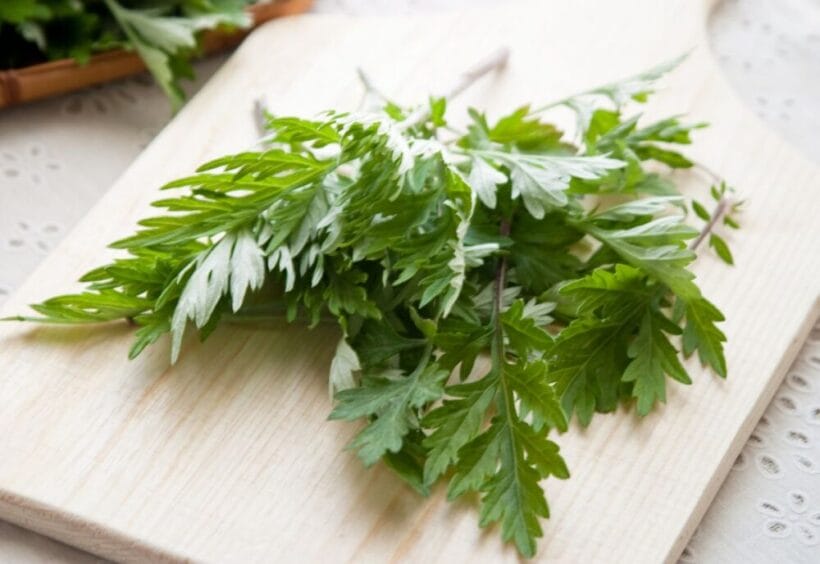
Garlic’s Guardian Role
In addition to being delicious, garlic (Allium sativum) is a powerful weapon against internal parasites.
Effectiveness: The active ingredient in garlic (allicin) has antiparasitic properties that kill and remove worms, making the gut environment healthier.
How to Use: Incorporate fresh garlic cloves or powdered garlic into the goats’ diet. Whether mixed with feed or provided as a treat, garlic offers a flavorful and effective means of deworming.
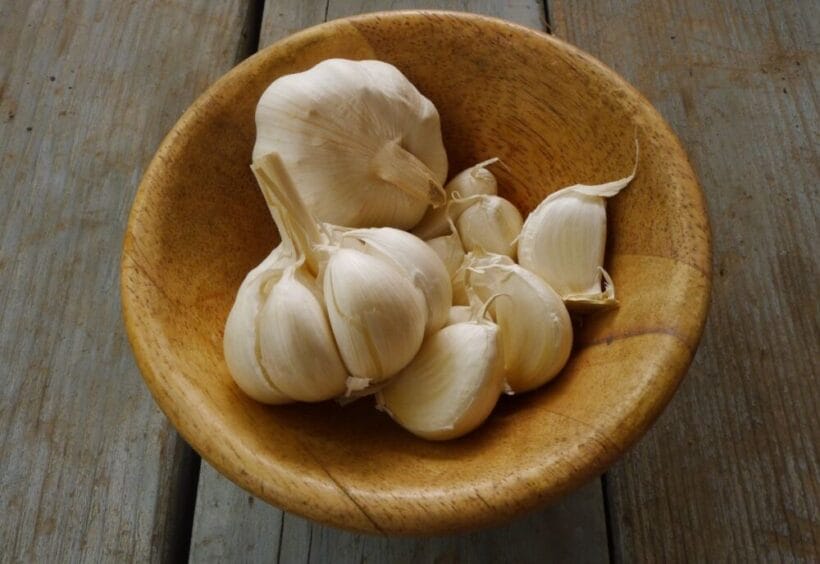
Thyme’s Triumph
The herb thyme (Thymus vulgaris), which is well known for its use in cooking, can also help goats stay healthy by killing worms naturally.
Effectiveness: A chemical found in thyme (thymol) has antiparasitic properties that stop the lifecycle of internal worms and boost the immune system of goats.
How to Use: You can give thyme as a fresh herb or mix dried thyme with feed. Thyme not only helps keep parasites away, but it also makes the goats’ food taste better.
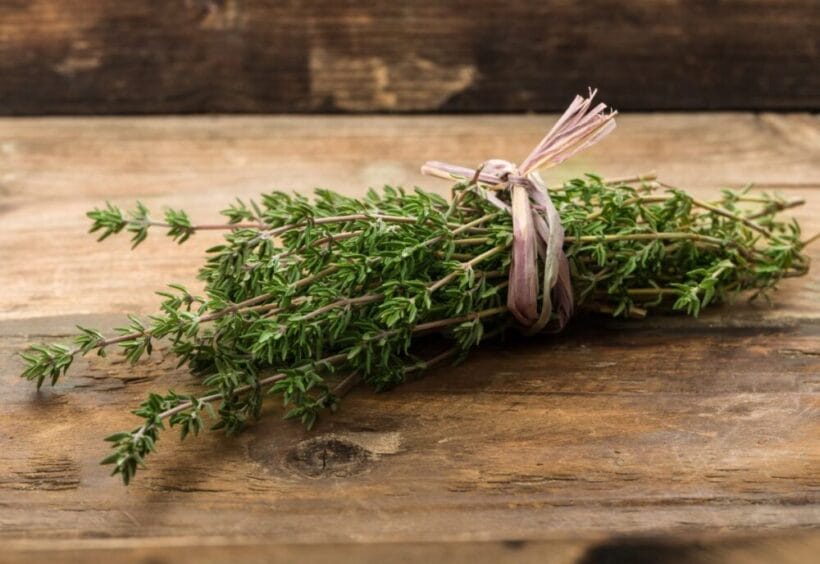
Safe Practices for Herbal Deworming
- Consultation: Before giving your goats herbal remedies, you should talk to a vet to make sure they will not make any conditions worse.
- Moderation: Use herbs in moderation to avoid potential toxicity. Follow the recommended guidelines for dosage based on the weight and age of your goats.
- Observation: Monitor the goats for any adverse reactions or changes in behavior. Adjust herbal treatments accordingly.
- Rotation: Rotate between different herbs to prevent the development of resistance in parasites and maintain the effectiveness of the deworming strategy.
Using these herbs’ powers will help you make a natural and effective deworming routine for your goats that will improve their health and make them more resistant to internal parasites.
Incorporating Diatomaceous Earth
Diatomaceous earth (DE), which comes from the microscopic remains of ancient algae, is safe and effective for goats as a natural dewormer. DE is a desiccant that dries out parasites’ exoskeletons and breaks them up when it comes into contact with them.
Application Methods:
Topical Dusting: Dust goats’ fur and bedding with DE to create a barrier against external parasites like mites and lice.
Feed Supplement: Mix food-grade DE into the goats’ feed to address internal parasites. Mix well to ensure that everyone gets the same amount.
Environmental Sprinkling: Spread DE in areas frequented by goats, such as barns and grazing spaces, to minimize the risk of parasite infestations.
Precautions for Optimal Results
- Quality Matters: Choose food-grade DE without added chemicals. This ensures the purity necessary for safe consumption by goats.
- Respiratory Protection: When applying DE in dusty environments, wear a mask to avoid inhalation. While harmless to goats, inhaling DE dust can irritate human lungs.
- Consistent Application: Incorporate DE into the goats’ routine consistently to maintain a protective shield against both internal and external parasites.
- Observation and Adjustments: Monitor the goats for any signs of discomfort or adverse reactions. Adjust DE applications based on seasonal changes and specific health considerations.
The Power of Pumpkin Seeds
Pumpkin seeds are one of the best natural dewormers because they are high in nutrients and kill parasites that live on goats.
There is a chemical called cucurbitacin in pumpkin seeds that can get rid of parasites in goats’ digestive systems. Besides getting rid of worms, pumpkin seeds are high in protein and nutrients, which are good for a goat’s health as a whole.
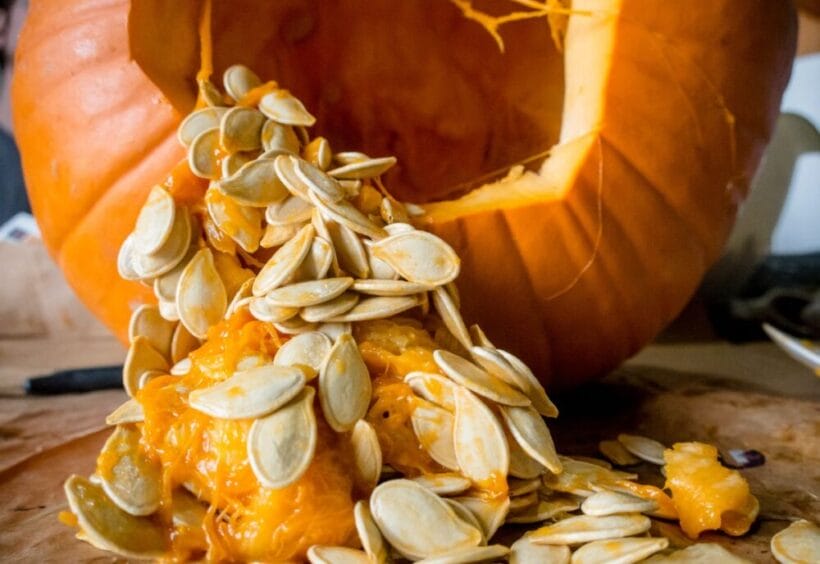
Choose fresh pumpkin seeds that have not been treated with chemicals or additives for your goats. Clean and dry them thoroughly.
Feeding Strategy:
Raw Consumption: Offer raw pumpkin seeds as a treat or mix them with the goats’ regular feed.
Ground Powder: Grind pumpkin seeds into a fine powder, making it easier to blend with feed.
Dosage Guidelines: While pumpkin seeds are generally safe, moderation is key. Introduce them gradually, starting with small amounts and monitoring goats for any adverse reactions.
Routine Integration for Optimal Results
Adjust your use of pumpkin seeds to the seasons and the cycles of nature. This could happen at the same time that pumpkins are ready for harvest in the fall. Watch the goats to see if their health or behavior changes. Incorporate pumpkin seeds more or less often, depending on how well they work and what each goat needs.
Apple Cider Vinegar Benefits
Apple Cider Vinegar (ACV) is a versatile natural remedy for goat health that kills parasites and has many other health benefits as well.
The acidic nature of apple cider vinegar makes the digestive system less welcoming for parasites, which helps get rid of them. ACV not only gets rid of parasites, but it also gives goats nutrients that are good for their health overall. It can even help the flavor of the goat’s milk!
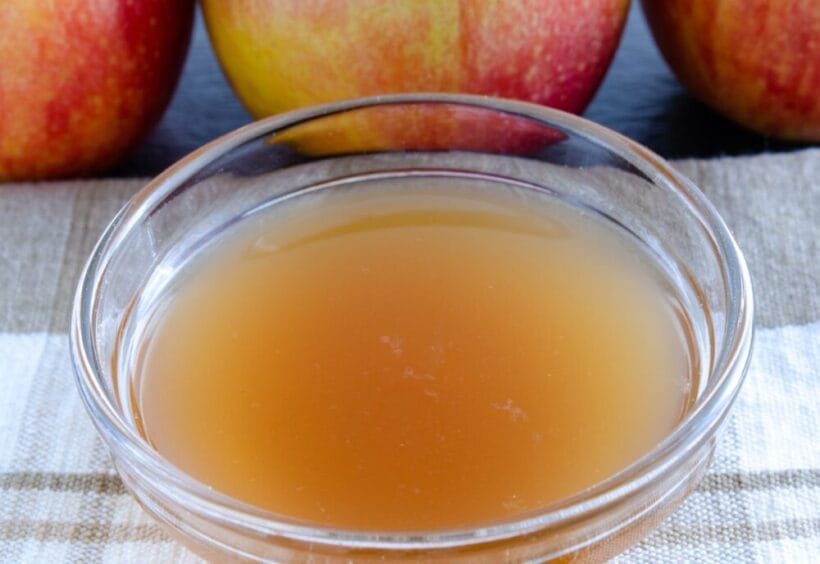
Mix 1-2 tablespoons of raw, unfiltered ACV per gallon of drinking water. Start with a diluted solution and gradually increase concentration, allowing goats to acclimate.
Additional Benefits of ACV
- Improved Digestion: ACV supports a healthy digestive system, reducing the likelihood of parasitic infestations.
- Mineral Absorption: Enhances mineral absorption, contributing to stronger bones and improved well-being.
- Immune System Boost: ACV’s wide range of nutrients helps boost the immune response, encouraging resistance to a variety of illnesses.
Incorporating ACV into Routine Care
Make giving the goats ACV a regular part of their routine to get the best results. Watch the goats for any signs that they are getting healthier, having fewer worms, or having changes in the condition of their coats.
Frequently Asked Questions
If you’ve found value in this blog post and enjoyed reading it, why not share it with your Pinterest community? Pin the image below and spread the love!
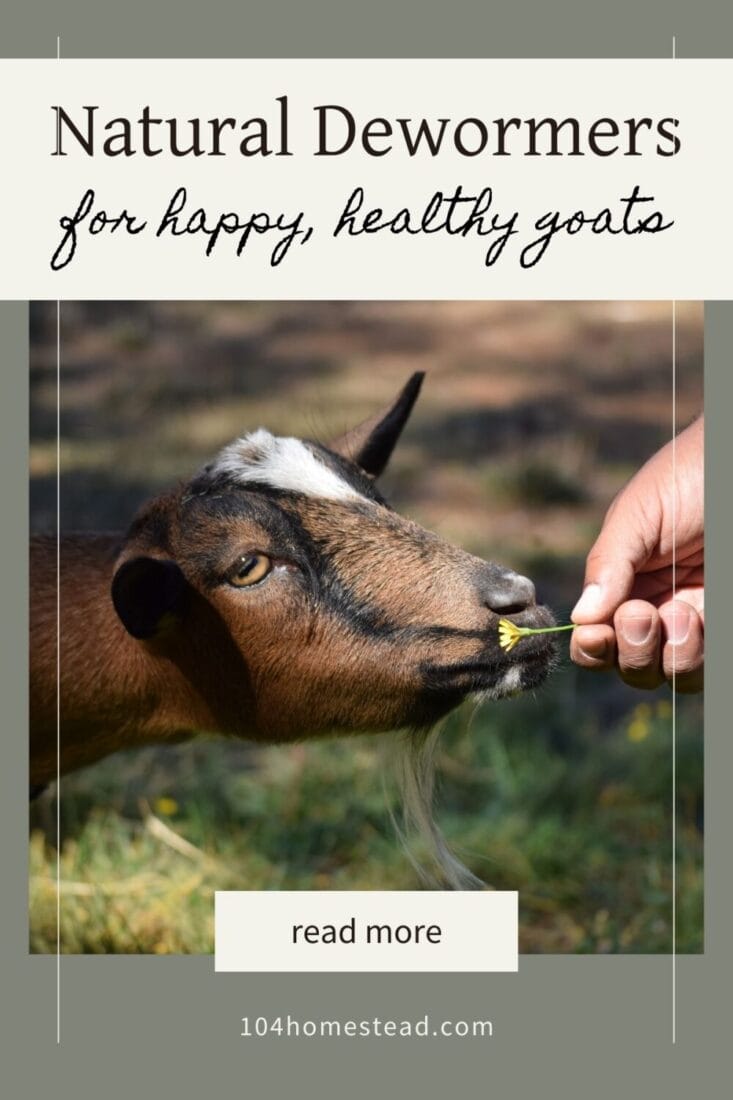
Natural dewormers offer a safe and effective alternative to chemical options for keeping your goats healthy and parasite-free. By incorporating herbs like wormwood, garlic, and thyme, as well as diatomaceous earth, pumpkin seeds, and apple cider vinegar, into your goats’ routine, you can promote their well-being while minimizing chemical exposure.
Remember to consult with a veterinarian, use herbs in moderation, observe your goats for any adverse reactions, and rotate between different deworming methods for optimal results.
What natural deworming methods have you tried for your goats? Share your experiences and tips in the comments below!
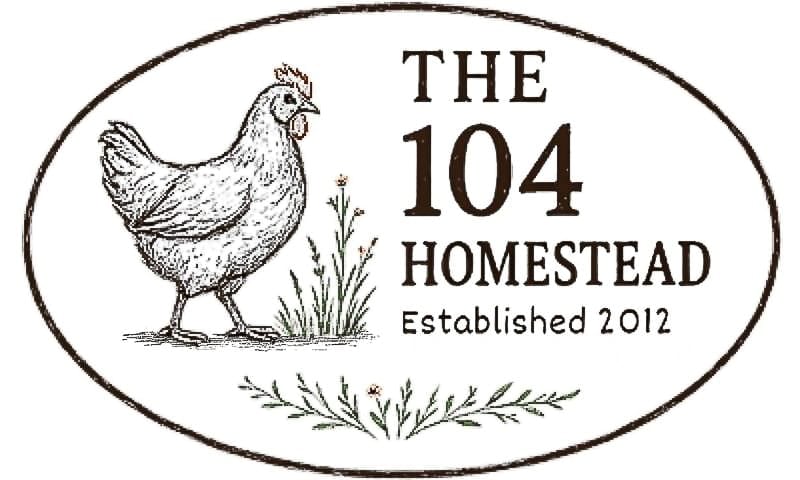
Where can i get this product at
The link to your Squirmy Wormy isn’t working for me…how can I purchase this for my goats?
Does this wormer treat cover lungworms? and if not what would you use?
Hi, new to your site. Loving it so far. Wondering approx how many squirmy wormy bites are in a bag. I’m unable to compute how much to buy, 8 oz doesn’t tell me anything. Plus they’re out of stock ?
Can I use the squirmy wormy on my sheep
Hi Jessica ,I’m confuse with all the different worms goats could have ,will this get rid of all types? I don’t like chemicals,,,I’ve been giving them a handful of worming pellets to each that a local mill uses on his goats ,but no sure if I like,it’s amazing how eone has own opinions and think theirs are right ways only! I just want to be good goat mom,mine are just pets ,no milking ,breeding
I have a female Nigerian who seems to cough a lot. Should I be worried or what should I do? I’m new at this. I also think she is pregnant.
Does she have a temperature? Is she eating well? Have you noticed any weight loss? Does the coughing seem to happen only when she’s active? Is it dry or productive? Sorry, that’s a lot of questions, but a cough can be related to so many things.
I’m interested in the squirmy wormy product. Is this good for sheep, cows and alpacas?
Yes it is! Dosing is based on weight, so you’ll want to do a little math. The only treat I know can’t cross species is Mineral Mojo. It has copper which is dangerous to sheep and possibly other livestock that don’t suffer deficiencies.